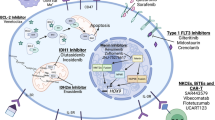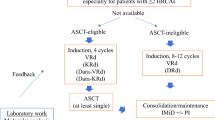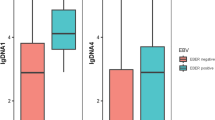Abstract
Purpose
In the last years, the influence of different genes involved in metabolism of chemotherapeutic agents has been studied. Methotrexate (MTX) is a key compound of chemotherapeutic regimens used in the treatment of acute lymphoblastic leukemia (ALL), primary central nervous system lymphoma (PCNSL) and Burkitt’s lymphomas (BL). This study aims to evaluate the role of MTHFR C677T and A1298C polymorphisms and G80A reduced folate carrier gene (RFC1) in a cohort of adult patients with lymphoproliferative malignancies submitted to high-dose MTX followed by leucovorin rescue.
Methods
We performed the analysis of these polymorphisms on genomic DNA with RFLP–PCR.
Results
Patients carrying MTHFR A1298C variant showed decreased hepatic and hematological toxicity (P = 0.03). Overall survival (OS) and progression-free survival (PFS) between homozygous wild-type and variant patients for the RFC1 G80A were significantly different (P = 0.035 and P = 0.02, respectively). A significant correlation between hematological toxicity and age (P = 0.003) was observed. There was no significant influence of MTHFR C677T genotype on toxicity, OS and PFS.
Conclusions
Leucovorin rescue given after high-dose MTX probably accounts for the lack of influence of C677T polymorphism. To better define a role of RFC1 polymorphism on patients outcome, it would be worthwhile to perform a study on intracellular MTX level and RFC1 substrate binding affinities in different genotypes.


Similar content being viewed by others
References
Blasco H, Senecal D, Le Gouge A et al (2010) Influence of methotrexate exposure on outcome in patients treated with MBVP chemotherapy for primary central nervous system lymphoma. Br J Clin Pharmacol 70(3):367–375
Yustein JT, Dang CV (2007) Biology and treatment of Burkitt’s lymphoma. Curr Opin in Hematol 14(4):375–381
Magrath I, Adde M, Shad A, Venzon D et al (1996) Adults and children with small non-cleaved-cell lymphoma have a similar excellent outcome when treated with the same chemotherapy regimen. J Clin Oncol 14(3):925–934
Bailey LB, Gregory JF (1999) Polymorphisms of methylenetetrahydrofolate reductase and other enzymes: metabolic significance, risks and impact on folate requirement. J Nutr 129(5):919–922
Ueland PM, Hustad S, Schneede J et al (2001) Biological and clinical implications of the MTHFR C677T polymorphism. Trends Pharmacol Sci 22(4):195–201
Chango A, Emery-Fillon N, de Courcy GP et al (2000) A polymorphism (80G→A) in the reduced folate carrier gene and its associations with folate status and homocysteinemia. Mol Genet Metab 70(4):310–315
De Marco P, Calevo MG, Moroni A et al (2003) Reduced folate carrier polymorphism (80A→G) and neural tube defects. Eur J Hum Genet 11(3):245–252
Shaw GM, Lammer EJ, Zhu H et al (2002) Maternal periconceptional vitamin use, genetic variation of infant reduced folate carrier (A80G), and risk of spina bifida. Am J Med Genet 108(1):1–6
Pei L, Liu J, Zhang Y et al (2009) Association of reduced folate carrier gene polymorphism and maternal folic acid use with neural tube defects. Am J Med Genet B Neuropsychiatr Genet 150B(6):874–878
Shang Y, Zhao H, Niu B et al (2008) Correlation of polymorphism of MTHFRs and RFC-1 genes with neural tube defects in China. Birth Defects Res A Clin Mol Teratol 82(1):3–7
Weisberg I, Tran P, Christensen B et al (1998) A second genetic polymorphism in methylenetetrahydrofolate reductase (MTHFR) associated with decreased enzyme activity. Mol Genet Metab 64(3):169–172
Frosst P, Blom HJ, Milos R et al (1995) A candidate genetic risk factor for vascular disease: a common mutation in methylenetetrahydrofolate reductase. Nat Genet 10(1):111–113
Trotti A, Byhardt R, Stetz J et al (2000) Common toxicity criteria: version 2.0. An improved reference for grading the acute effect of cancer treatment: impact on radiotherapy. Int J Radiat Oncol Biol Phys 47(1):13–47
Chiusolo P, Reddiconto G, Cimino G et al (2004) Methylenetetrahydrofolate reductase genotypes do not play a role in acute lymphoblastic leukemia pathogenesis in the Italian population. Haematologica 89(2):139–144
Aplenc R, Thompson J, Han P et al (2005) Methylenetetrahydrofolate reductase polymorphisms and therapy response in pediatric acute lymphoblastic leukemia. Cancer Res 65(6):2482–2487
Krajinovic M, Lemieux-Blanchard E et al (2004) Role of polymorphisms in MTHFR and MTHFD1 genes in the outcome of childhood acute lymphoblastic leukemia. Pharmacogenomics J 4(1):66–72
Krajinovic M, Lamothe S, Labuda D et al (2004) Role of MTHFR genetic polymorphisms in the susceptibility to childhood acute lymphoblastic leukemia. Blood 103(1):252–257
Kim HN, Kim YK, Lee IK et al (2009) Association between polymorphisms of folate-metabolizing enzymes and hematological malignancies. Leuk Res 33(1):82–87
Chiusolo P, Reddiconto G, Cimino G et al (2004) Methylenetetrahydrofolate reductase genotypes do not play a role in acute lymphoblastic leukemia pathogenesis in the Italian population. Haematologica 89(2):139–144
Ongaro A, De Mattei M, Della Porta MG et al (2009) Gene polymorphisms in folate metabolizing enzymes in adult acute lymphoblastic leukemia: effects on methotrexate-related toxicity and survival. Haematologica 94(10):1391–1398
Liu JX, Chen JP, Tan W et al (2008) Association between MTHFR gene polymorphisms and toxicity of HDMTX chemotherapy in acute lymphocytic leukemia. Zhongguo Shi Yan Xue Ye Xue Za Zhi 16(3):488–492
Kantar M, Kosova B, Cetingul N et al (2009) Methylenetetrahydrofolate reductase C677T and A1298C gene polymorphisms and therapy-related toxicity in children treated for acute lymphoblastic leukemia and non-Hodgkin lymphoma. Leuk Lymphoma 50(6):912–917
Toffoli G, Russo A, Innocenti F et al (2003) Effect of methylenetetrahydrofolate reductase 677C→T polymorphism on toxicity and homocysteine plasma level after chronic methotrexate treatment of ovarian cancer patients. Int J Cancer 103(3):294–299
Urano W, Taniguchi A, Yamanaka H et al (2002) Polymorphisms in the methylenetetrahydrofolate reductase gene were associated with both the efficacy and the toxicity of methotrexate used for the treatment of rheumatoid arthritis, as evidenced by single locus and haplotype analyses. Pharmacogenetics 12(3):183–190
Shimasaki N, Mori T, Samejima H et al (2006) Effects of methylenetetrahydrofolate reductase and reduced folate carrier 1 polymorphisms on high-dose methotrexate-induced toxicities in children with acute lymphoblastic leukemia or lymphoma. J Pediatr Hematol Oncol 28(2):64–68
Seidemann K, Book M, Zimmermann M et al (2006) MTHFR 677 (C→T) polymorphism is not relevant for prognosis or therapy-associated toxicity in pediatric NHL: results from 484 patients of multicenter trial NHL-BFM 95. Ann Hematol 85(5):291–300
Chiusolo P, Reddiconto G, Farina G et al (2007) MTHFR polymorphisms’ influence on outcome and toxicity in acute lymphoblastic leukemia patients. Leuk Res 31(12):1669–1674
Huang L, Tissing WJ, de Jonge R et al (2008) Polymorphisms in folate-related genes: association with side effects of high-dose methotrexate in childhood acute lymphoblastic leukemia. Leukemia 22(9):1798–1800
de Jonge R, Hooijberg JH, van Zelst BD et al (2005) Effect of polymorphisms in folate-related genes on in vitro methotrexate sensitivity in pediatric acute lymphoblastic leukemia. Blood 106(2):717–720
Jansen G, Mauritz R, Drori S et al (1998) A structurally altered human reduced folate carrier with increased folic acid transport mediates a novel mechanism of antifolate resistance. J Biol Chem 273(46):30189–30198
Whetstine JR, Gifford AJ, Witt T et al (2001) Single nucleotide polymorphisms in the human reduced folate carrier: characterization of a high-frequency G/A variant at position 80 and transport properties of the His(27) and Arg(27) carriers. Clin Cancer Res 7(11):3416–3422
Dervieux T, Furst D, Lein DO et al (2004) Polyglutamation of methotrexate with common polymorphisms in reduced folate carrier, aminoimidazole carboxamide ribonucleotide transformylase and thymidylate synthase are associated with methotrexate effects in rheumatoid arthritis. Arthritis Rheum 50(9):2766–2774
Rocha JC, Cheng C, Liu W et al (2005) Pharmacogenetics of outcome in children with acute lymphoblastic leukemia. Blood 105(12):4752–4758
Lavardière C, Chiasson S, Costea I et al (2002) Polymorphism G80A in the reduced folate carrier gene and its relationship to methotrexate plasma levels and out come of childhood acute lymphoblastic leukemia. Blood 100(10):3832–3834
Ashton LJ, Gifford AJ, Kwan E et al (2009) Reduced folate carrier and methylenetetrahydrofolate reductase gene polymorphisms: associations with clinical outcome in childhood acute lymphoblastic leukemia. Leukemia 23(7):1348–1351
Acknowledgments
This work was supported by Fondi di Ricerca Linea D1 progetti di ricerca 2009.
Conflict of interest
None.
Author information
Authors and Affiliations
Corresponding author
Additional information
Patrizia Chiusolo and Sabrina Giammarco equally contributed to the study.
Rights and permissions
About this article
Cite this article
Chiusolo, P., Giammarco, S., Bellesi, S. et al. The role of MTHFR and RFC1 polymorphisms on toxicity and outcome of adult patients with hematological malignancies treated with high-dose methotrexate followed by leucovorin rescue. Cancer Chemother Pharmacol 69, 691–696 (2012). https://doi.org/10.1007/s00280-011-1751-4
Received:
Accepted:
Published:
Issue Date:
DOI: https://doi.org/10.1007/s00280-011-1751-4




